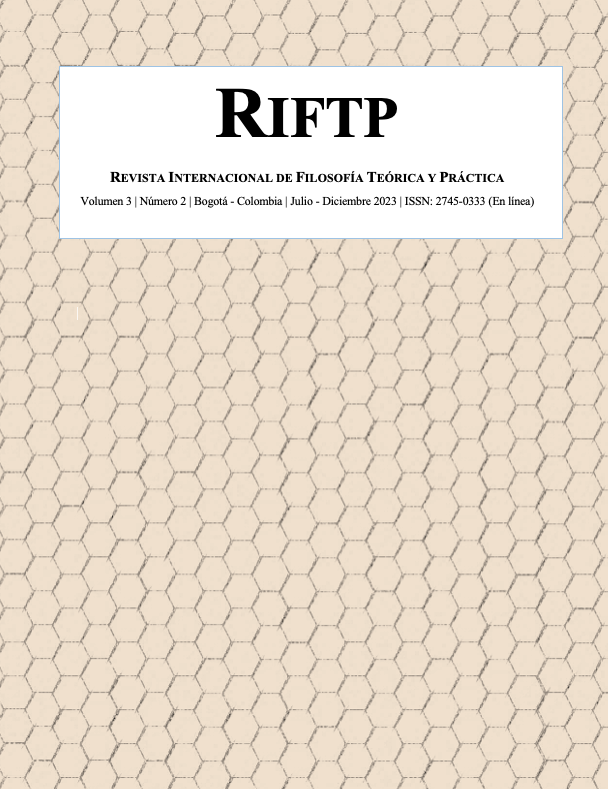La educación tradicional en la esfera pública: Un terreno en disputa
DOI:
https://doi.org/10.51660/riftp.v3i2.81Palabras clave:
educación tradicional, retorno, Estados Unidos, impugnación discursiva, esfera públicaResumen
El resurgimiento de la educación tradicional en los Estados Unidos ha generado un intenso debate en la esfera pública. Este artículo examina el debate discursivo que rodea este fenómeno. A medida que las críticas hacia los enfoques educativos progresistas se intensifican, defensores de la educación tradicional argumentan a favor de un retorno a métodos pedagógicos más tradicionales. Este resumen destaca el papel de la esfera pública como espacio de conflicto y negociación de ideas en torno a la educación. Al explorar las perspectivas y los argumentos en disputa, el artículo busca arrojar luz sobre el resurgimiento de la educación tradicional y su impacto en el sistema educativo de los Estados Unidos.
Descargas
Referencias
Adler, M. J. (1982). The Paideia proposal: An educational manifesto. New York, NY: Macmillan.
Aparicio-Gómez, O.Y. (2020). The education of desire and the use of ICT. In Bosch, M. (Ed.). Desire and Human Flourishing: Perspectives from Positive Psychology, Moral education and Virtue Ethics (pp. 325-337). New York, USA: Springer Publishing. ISBN: 978-3-030-47001-2. https://doi.org/10.1007/978-3-030-47001-2_22
Aparicio-Gómez, Oscar-Yecid, Aparicio-Gómez, William-Oswaldo, Hernández, J. (2020). Formación del profesorado en ambientes virtuales de aprendizaje. En: Hinojo, F., et. al. (Eds.). Experiencias e Investigaciones en Contextos Educativos (pp. 604-613). Madrid: Dykinson S.L. ISBN: 978-84-1377-171-7.
Aparicio-Gómez, Oscar-Yecid, Ostos-Ortiz, Olga-Lucía, Mesa-Angulo, José-Gabriel. (2022). La convergencia de aprendizajes en el metaverso. RIIEP. Vol. 15, Núm. 2. https://doi.org/10.15332/25005421.7879
Aparicio-Gómez, Oscar-Yecid, Ostos-Ortiz, Olga-Lucía, Mesa-Angulo, José-Gabriel. (2022). La percepción de la covid-19 en el ámbito universitario. Hallazgos, Vol. 19, Núm. 38. https://doi.org/10.15332/2422409X.7966
Apple, M. W. (2004). Ideology and curriculum (3rd ed.). New York, NY: RoutledgeFalmer.
Au, K. H., & Rueda, R. (2011). Schooling and academic achievement in diverse cultural contexts. Mahwah, NJ: Lawrence Erlbaum Associates.
Ball, S. J. (1993). Education, economy, and social capital: Some preliminary thoughts. Education Policy, 7(2), 106-117.
Berliner, D. C. (2005). The near impossibility of testing for teacher quality. Education Next, 5(3), 32-37.
Biesta, G. J. J. (2013). The beautiful risk of education. Boulder, CO: Paradigm.
Bourdieu, P. (1977). Outline of a theory of practice. Cambridge, UK: Cambridge University Press.
Bowles, S., & Gintis, H. (1976). Schooling in capitalist America: Educational reform and the contradictions of economic life. New York, NY: Basic Books.
Cuban, L. (2003). The perfect failure: America's schools, race, and inequality. New York, NY: Teachers College Press.
Darling-Hammond, L. (2004). What matters most: Teaching for America's future. New York, NY: Teachers College Press.
Eisner, E. W. (1994). The educational imagination: On the design and evaluation of school programs (3rd ed.). New York, NY: Macmillan.
Giroux, H. A. (1988). Teachers as intellectuals: Toward a critical pedagogy of learning. Westport, CT: Bergin & Garvey.
Goodlad, J. I. (1984). A place called school: Prospects for the future. New York, NY: McGraw-Hill.
Hursh, D. (2005). The work of schooling: Teaching, learning, and research. New York, NY: RoutledgeFalmer.
Labaree, D. F. (2000). The trouble with testing: Limits of educational assessment. Cambridge, MA: Harvard University Press.
Levine, D. U. (2006). The American school: A documentary history (3rd ed.). New York, NY: Routledge.
Noddings, N. (2002). Educating for intelligent belief or intelligent disbelief. New York, NY: Teachers College Press.
Ostos-Ortiz, Olga-Lucía, Aparicio-Gómez, Oscar-Yecid, von Feigenblatt, Otto. (2023). Assessing a country's scientific contribution towards sustainability from higher education: a methodology for measuring progress towards the Sustainable Development Goals. RIIEP. Vol. 16, Núm. 2. ISSN: 2500-5421
Pinar, W. F. (2004). What is curriculum theory? Mahwah, NJ: Lawrence Erlbaum Associates.
Ravitch, D. (2010). The death and life of the great American school system: How testing and choice are undermining education. New York, NY: Basic Books.
Shor, I. (1980). Critical teaching and everyday life. New York, NY: Teachers College Press.
von Feigenblatt, O. F. (2023). Introducing the emerging field of Academic Diplomacy Universidad y Sociedad, 15(2), 316-325.
von Feigenblatt, O. F. (2023). Tendencias y Debates en la Educación Americana: Una Perspectiva Hispana. Barcelona: Ediciones Octaedro.
von Feigenblatt, O. F. (2022). SVNS-based multicriteria methods for the selection of management elements for academic diplomacy. Neutrosophic Sets and Systems, 52, 241-250.
von Feigenblatt, O. F. (2023). The Perfect Storm: Structural and Contextual Factors Exacerbating the Teacher Shortage in Florida. Hallazgos, 20(39).
von Feigenblatt, Otto Federico von. (2022). "Traditional Education is Making a Comeback in the United States: Discursive Contestation in the Public Sphere." In Transcending the Eternal Debate between Traditional and Progressive Education, edited by Otto Federico von Feigenblatt and Oscar Yecid Aparicio Gomez, 17-42. Editorial Octaedro
Descargas
Publicado
Número
Sección
Licencia
Derechos de autor 2023 Revista Internacional de Filosofía Teórica y Práctica

Esta obra está bajo una licencia internacional Creative Commons Atribución-NoComercial-CompartirIgual 4.0.
Los artículos se publican bajo los términos de una licencia que permite el uso, distribución y reproducción en cualquier medio, siempre que el trabajo original se cite correctamente. Ed&TIC conserva los derechos patrimoniales de las obras publicadas y promueve activamente la reutilización de las mismas bajo los términos de la licencia mencionada anteriormente, lo que fomenta la difusión del conocimiento y la colaboración en la comunidad académica.


